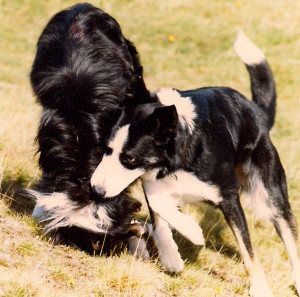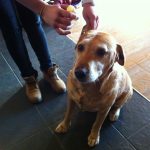When Dogs Play Too Rough.
Dogs love to romp and play together – chasing, stalking and bowling one another over, is all part of the fun. This is normal dog behaviour and it is how dogs learn to socialise. Playing is an important part of learning for all dogs. However, when does dog play turn to fighting? Read our Holidays4Dogs article on when dogs play too rough.
Some dogs can be more playful than others, but those that really enjoy games with other dogs often have a better capacity to learn in general.  However, sometimes, things can get a little out of hand if one, or more, dogs get over exuberant.
However, sometimes, things can get a little out of hand if one, or more, dogs get over exuberant.
Just like children, dogs often need the supervision of a responsible adult to make sure no squabbles develop. This is frequently the case between dogs that don’t know each other very well.
Normal play between dogs will involve a lot of rough and tumbling, often high pitched ‘yips’, growls and snarls. Play fighting may involve leg nipping, neck pulling and lots of tumbling from both dogs – and if you watch carefully dogs will take turns at being ‘winners’ and ‘losers’.
However, if the play seems one sided, it is time to step in and calm the situation down. Here a few behaviours to watch for that may indicate things are getting a little too heated.
- Growling becomes low, long and ferocious sounding.
- Stiff posturing.
- Lip curling and glazed stares.
- Running away with tail tucked up.
- Distressed yelping.
- Lip licking, turning away, retreating.
Down time.
If play turns too rough, dogs can become mildly stressed. Therefore, it is a good idea to separate the dogs for a short while so that tension levels can drop. This is particularly important for puppies engaging in play with older dogs, since it is important that puppies have positive experiences with other dogs.
It can sometimes be tricky to interpret inappropriate play from normal rough and tumble – the latter of which, can often be dramatic and noisy. However, watch out for signs and try to stop rough play before it begins.
It is also important to be especially observant if the dogs at play of differing sizes. It may seem obvious, but a larger dog can quickly easily hurt a smaller dog, even in normal play. Don’t forget, many dogs just aren’t bothered about playing with other dogs. Just like people, some dogs may prefer their own company and entertain themselves, or play with their owners.
Training.
It is helpful if your dog knows basic commands, as this will make it easier to intervene if dog play becomes too rough. ‘Leave’, ‘sit’ and ‘down’ are all useful cues for your dog to learn. Training your dog is an integral part of dog ownership and all dogs need to learn good manners when around people and other dogs. Always make sure training is positive.
Neutering.
Neutering is an option if you find you have an excessively boisterous male dog, as this may help to calm things down. Extra consideration should be given to aggressive bitches, however, as studies have shown that neutering can exacerbate this. For further information on neutering please see our other Holidays4Dogs article.
Conclusion.
Playing is most definitely a healthy part of canine socialization and should not be discouraged. However, when dogs play too rough, it can be an issue – especially if it results in dog bites to other animals, or humans. It is also a good idea to be mindful of children in the vicinity while dogs are playing. It is very easy for a couple of whirling dogs to bowl over a small child as easy as a ten pin.
If you feel you might be dealing with a more serious behaviour issue involving frequent, or sudden aggression during social play, it would be wise to consult your vet. Significant behavioural problems involving excessive aggression can be dealt with by an experienced trainer, or behaviourist, after physical signs have been ruled out.


